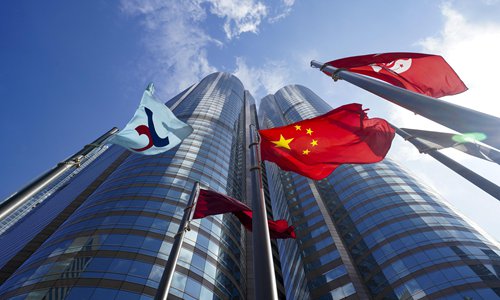HK stock market picks up steam after security law takes effect
By GT staff reporters Source:Global Times Published: 2020/7/2 21:49:47
Ensured stability means investors can look forward to robust performance

The Hong Kong Stock Exchange building on July 11 2019 Photo: VCG
The Hong Kong market entered rally mode on Thursday, with the benchmark Hang Seng Index (HSI) closing 2.85 percent up on the first trading day after the National Security Law for the city took effect.
The rally on Thursday, led by property and insurance companies, propelled the HSI to a close above 25,000. Increased local market vibrancy reflects assured investor sentiment, market watchers said, as the newly adopted law and a flurry of listings on the local bourse by US-listed Chinese firms arguably underpins the strength of the local bourse operator, taking a long position in the Hong Kong market.
Shares in Hong Kong Exchanges and Clearing Limited (HKEX), the operator of the local stock market which is traded on the market also, gained 6.06 percent on Thursday, hitting a record new high.
Some of the best performers of the day soared more than 5 percent, including the Beijing-based China Life Insurance, up 9.74 percent, with China Resources Land up 7.84 percent and New World Development up 7.61 percent.
The gains reflect a positive view of the National Security Law by investors, who are anticipating a more stable financial environment and a stronger link to the Chinese mainland economy, Dong Dengxin, director of the Finance and Securities Institute at the Wuhan University of Science and Technology, told the Global Times on Thursday.
"The economic activities in Hong Kong and its financial market were under heavy strain amid the protests, when chaos ravaged the city with transportation cut and banks vandalized," Dong said. "For finance people, the National Security Law is speaking for a more stable and favorable environment for their capital in the market."
The economic impact from the protests, starting from last year, first took a toll on Hong Kong's retail sector, which has been further dampened by the lack of mainland tourists spending in the city amid the coronavirus crisis. Hong Kong's capital market was also under strain during the protest.
Tighter links with the mainland are expected to inject further confidence into investors.
"With more mainland companies going to Hong Kong, there will be ample capital in the market, and the Hong Kong stock exchange's portfolio will also be diversified by Chinese technology and other high-growth sectors," Dong said.
Chinese companies already account for 73 percent of the stock market capitalization in Hong Kong, and more than 80 percent of IPO funds raised in the city last year are China-related, according to Reuters.
Aiming to establishing strong ties with the mainland and benefit from its financial liberation, the Hong Kong Stock Exchange underwent unprecedented reform in 2018, allowing loss-making tech companies and companies with weighted voting rights to be listed, with certain conditions met.
With the past reforms and future ensured stability, investors have good reason to look forward to the market's long-term robust performance, in spite of the US' recent revocation of the special status of the city, Dong said.
The Hong Kong market is predicted to welcome 180 IPOs for the whole of 2020, with funds to be raised totaling between HK$230-260 billion ($29.7-33.5 billion), PwC data showed on Thursday.
The Hong Kong IPO market is likely to continue to thrive, with the local bourse operator estimated to once again secure a spot in the top three global IPO market rankings, PwC revealed, and the Hong Kong market is expected to welcome six to eight secondary listings from US-listed Chinese firms throughout the year.
As part of efforts to enhance market efficiency, HKEX announced in late June it would shorten the listing cycle of structure products from five trading days to three.
The Hong Kong market appears to be much more vibrant this year with a daily trading volume of over HK$100 billion on average, versus the previous year's number of roughly HK$80 billion, said Raymond Deng, investment strategist CIO of consumer investment and insurance products at DBS Bank.
Local market strength is being underpinned by capital inflows into the city as interest rates in the US, Japan and Europe pale in comparison with levels in the Hong Kong market, which adding to the US move to rein in the yield curve renders the Hong Kong market a more alluring destination for global investors, Deng told the Global Times on Thursday.
Additionally, the investment worthiness of mainland firms traded on the Hong Kong market, especially those in the technology, bio-pharmaceutical and e-commerce sectors, makes not only mainland investors but investors from across the globe aspire to get involved in the local market, he commented.
The Hang Seng Index is estimated to hit 26,300 points by the end of the year, according to DBS.
Newspaper headline: HK stock market picks up steam
Posted in: ECONOMY